Published in Nacional number 640, 2008-02-18
WINGS OF THE CROATIAN AIR FORCE CLIPPED
New helicopters ready for overhaul
Because of criminal activities in the DEFENCE MINISTRY, the military will receive ten Russian Mi-171S helicopters worth US million, complete with equipment meeting only 20 year old standards
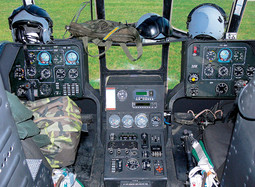 Technologically obsolete cockpit The Defence Ministry is facing a huge scandal following the acquisition of 10 new Russian Mi-171S helicopters worth US million. Failures emerged in all four radio transmitters in the first two helicopters, with register plates H-220 and H-221, after only several flight hours. The communication and navigation equipment based on NATO standards are not compatible with Russia and problems have emerged: the integration of the circuits are dysfunctional for pilot use, especially when dealing with instrumental flight, and there is no FMS or equipment for flight programming which is connected to autopilot.
Technologically obsolete cockpit The Defence Ministry is facing a huge scandal following the acquisition of 10 new Russian Mi-171S helicopters worth US million. Failures emerged in all four radio transmitters in the first two helicopters, with register plates H-220 and H-221, after only several flight hours. The communication and navigation equipment based on NATO standards are not compatible with Russia and problems have emerged: the integration of the circuits are dysfunctional for pilot use, especially when dealing with instrumental flight, and there is no FMS or equipment for flight programming which is connected to autopilot.
Despite the fact that pilots demanded high quality seats which would save their spines in the case of an accident, the seats on these helicopters date back 20 years. Furthermore, the request for installing air-conditioning was refused which will be problematic in the summer months, and the helicopters do not have a glass cockpit, specifically several multifunctional LCD monitors which synoptically show the operations of tens of instruments which are normally on the command board. The only good parts of the helicopters are the GPS and radar systems.
The fact that the specifications for necessary equipment were completed by several members of the Croatian Air Force proves that the acquisition of new helicopters was not at all transparent. Furthermore, from sources close to the transport squadrons, Nacional has uncovered that the test pilots for helicopters within the Croatian Air Force, from the arrival of the first Mi-171S helicopters, were not invited to try them out, which is a huge error, as the test pilots are responsible for testing the soundness and functionality of all equipment and circuits in the helicopter and to give their opinions on the state of the art. The test pilots should have immediately been the first individuals to try out the new helicopters as soon as they arrived from Russia, which was not the case. Pilots from the 28th helicopter squadron believe that everything they have experienced in the new helicopters is far from the advanced technology they expected. The most responsible individuals for this negligence are the commanders of the 28th squadron for transport helicopters from Lucko and former head of logistics at the Croatian Air Force, Brigadier Mirko Ljevar, who is responsible for the entire project for acquiring and equipping the Mi-171S helicopters for Croatia. Everything on the helicopters, as well as the internal equipment, was constructed by the Russians based on his request and they are not responsible for the equipment which was installed.
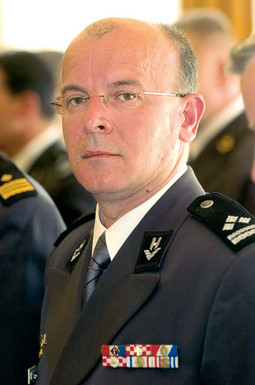 COMMANDER OF THE CROATIAN AIR FORCE General Vlado Bagaric is Mirko Ljevar’s only protector Due to the fact that the helicopters could have been equipped with all sought after modern equipment because of the Russian clearing debt, without cash transfers resulting in expenditures of the state budget, it is clear that a detrimental contract was signed. Because of this mistake, Croatian tax payers will soon have to provide millions of dollars in cash so that the new helicopters would surely be new, not only on the outside but also on the inside.
COMMANDER OF THE CROATIAN AIR FORCE General Vlado Bagaric is Mirko Ljevar’s only protector Due to the fact that the helicopters could have been equipped with all sought after modern equipment because of the Russian clearing debt, without cash transfers resulting in expenditures of the state budget, it is clear that a detrimental contract was signed. Because of this mistake, Croatian tax payers will soon have to provide millions of dollars in cash so that the new helicopters would surely be new, not only on the outside but also on the inside.
It is interesting that, before leading individuals at the Defence Ministry learned about the unhappiness of pilots in the equipment provided in the new helicopters, the poor condition of the new helicopters was well known by the director of the company Informatika Sistemi, Djuro Sesar. We have unravelled that Sesar, following informal contact, has already shown his desire to provide services for the modernization of those helicopters through his mediation. Sesar is well known for the fact that he was a key individual in contracting overhaul services for Croatian helicopters in 2004, where it was proven that numerous provisions of legal acts were infringed, and the consequences are still felt today, as they were during the Kornati tragedy when the helicopter winch and rescue hoist were not in working order, both ordered during the questionable overhaul. Over the past ten years, Sesar was a supplier of unoriginal and useless spare parts for Croatian flight vessels from waste depots throughout the former USSR. The recently acquired Zlin-242 aircrafts also arrived through Sesar. This is an individual who is very connected to all important persons in the military acquisition system, mainly within the Air Force. A key question which the Defence Ministry has been asking these days is whether management at the Croatian Air Force requested such equipment on the new helicopters so that they would quickly need to be modernized soon after their arrival to Croatia.
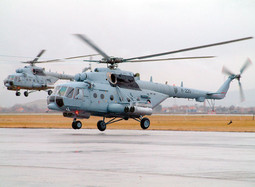 THE TWO NEW HELICOPTERS were never flown by test pilots, which is unheard of The former deputy head of logistics of the Croatian Air Force and project leader for acquisition of the Mi-171S Brigadier Mirko Ljevar is connected to Djuro Sesar. Through Sesar’s mediation last year, Ljevar acquired obsolete circuits for filling vessel accumulators from depots in the region of the former USSR. Similar circuits were discarded from the Aircraft Institute in Velika Gorica six years ago as they were obsolete; the Institute then purchased digital circuits.
THE TWO NEW HELICOPTERS were never flown by test pilots, which is unheard of The former deputy head of logistics of the Croatian Air Force and project leader for acquisition of the Mi-171S Brigadier Mirko Ljevar is connected to Djuro Sesar. Through Sesar’s mediation last year, Ljevar acquired obsolete circuits for filling vessel accumulators from depots in the region of the former USSR. Similar circuits were discarded from the Aircraft Institute in Velika Gorica six years ago as they were obsolete; the Institute then purchased digital circuits.
That did not stop Ljevar from taking advantage of the state budget. Ljevar is also known because he acquired R-60M rocket carriers on the MiG’s for US,000, at the same time as the acquisition of the accumulator fillers, which the Croatian Armed Forces no longer has because they were written off four years ago. In this case, the state budget was again drained without any consequences faced by Ljevar.
Ljevar’s main protector is commander of the Croatian Air Forces General Vlado Bagaric, who protected him recently when Ljevar should have been degraded and transferred to the Zemunik air base due to his negligence. Instead of that, Bagaric left him in charge of the currently most important project in aeronautics – acquiring new Mi-171S helicopters.
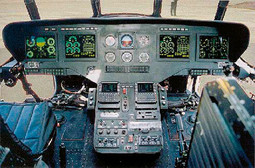 THE MODERN PILOT cabin of the Russian Mi-171S helicopter compared to the cabin of the Croatian Mi-171S is proof of the absolute shortcomings Recently, Defence Minister Branko Vukelic announced that participation by mediators in acquisition of reserve parts for the Croatian Air Force would be completely abolished and that all parts would have to be purchased from original manufacturers, while the overhaul of aircrafts would be carried out exclusively in Institutes which are certified by original manufacturers. However, based on the aforementioned, a large cleanup should occur in the Defence Ministry; this will not be done soon because some people who do not belong to the defence system are too positioned within it through assistance by employed officers. One clear example is proof that all sorts of people are involved in the Croatian defence system. At the end of last week, a delegation of Russian state-owned companies for arms transportation, Rosoboronoexport, came to Croatia to gather additional information on tenders for equipping the Croatian Air Force with new multipurpose fighter jets. Croatian negotiators realized that a member of their delegation was Konstantin Nikolic who represents the ACM company from Zagreb, through which the Russians are trying to sell their aircrafts. Nikolic was the head of the Alan State Agency, whose task was to provide new documentation within a day or two following complaints and claims made by the Aircraft Institute on the quality of parts for vessels, as well as missing documentation.
THE MODERN PILOT cabin of the Russian Mi-171S helicopter compared to the cabin of the Croatian Mi-171S is proof of the absolute shortcomings Recently, Defence Minister Branko Vukelic announced that participation by mediators in acquisition of reserve parts for the Croatian Air Force would be completely abolished and that all parts would have to be purchased from original manufacturers, while the overhaul of aircrafts would be carried out exclusively in Institutes which are certified by original manufacturers. However, based on the aforementioned, a large cleanup should occur in the Defence Ministry; this will not be done soon because some people who do not belong to the defence system are too positioned within it through assistance by employed officers. One clear example is proof that all sorts of people are involved in the Croatian defence system. At the end of last week, a delegation of Russian state-owned companies for arms transportation, Rosoboronoexport, came to Croatia to gather additional information on tenders for equipping the Croatian Air Force with new multipurpose fighter jets. Croatian negotiators realized that a member of their delegation was Konstantin Nikolic who represents the ACM company from Zagreb, through which the Russians are trying to sell their aircrafts. Nikolic was the head of the Alan State Agency, whose task was to provide new documentation within a day or two following complaints and claims made by the Aircraft Institute on the quality of parts for vessels, as well as missing documentation.
 In the Dnevnik newspaper published on 10 December 2004, an article emerged on a range of compromising information surrounding the role of Mirko Ljevar in acquiring aircrafts and spare parts for the needs of the Croatian Air Force; the article refers to the notes made by the Security Intelligence Services at the Defence Ministry The task of the Military Intelligence-Security Agency surely should be to uncover where and how Nikolic produced those certificates in such a short period. No one ever investigated as to whether there was an office or garage where this was done. The fact is that every second or third acquisition of spare parts for helicopters or MiG’s, which arrive in the Aircraft Institute, result in claims: either the spare parts are discarded, or they do not have a valid certificate or ˝passport˝ which must include all source information on the production year, manufacturer, expiry period, etc. Back in 2001, Nikolic came to the Aircraft Institute with an oxygen tank for MiG pilots with a production date of 1999, and he brought documentation stating that service of the tank was completed in 1998. Several months ago, Nacional learned about this from Russian engineer Sergej Pan, a former employee of the Aircraft Institute in Velika Gorica who had to leave Croatia under pressure from dealers and provision hunters because they began to threaten him due to his refusal to take falsified documents and spare parts of suspicious quality. The removal of the corrupt acquisition system is not being mentioned by Defence Minister Branko Vukelic in his statements either. In an interview for Vecernji list, when asked whether spare parts with suspicious origins were acquired in the previous mandate, he sent a completely wrong message – that the media was wrong for even reporting this because the competition was delivering such information to them without knowledge of the Defence Ministry. Of course, Vukelic did not want to acknowledge the fact that the acquisition system totally failed, because he would have directly accused his party colleague Berislav Roncevic. Instead of that, he accused the media and competition on the markets for apparently delivering information to journalists.
In the Dnevnik newspaper published on 10 December 2004, an article emerged on a range of compromising information surrounding the role of Mirko Ljevar in acquiring aircrafts and spare parts for the needs of the Croatian Air Force; the article refers to the notes made by the Security Intelligence Services at the Defence Ministry The task of the Military Intelligence-Security Agency surely should be to uncover where and how Nikolic produced those certificates in such a short period. No one ever investigated as to whether there was an office or garage where this was done. The fact is that every second or third acquisition of spare parts for helicopters or MiG’s, which arrive in the Aircraft Institute, result in claims: either the spare parts are discarded, or they do not have a valid certificate or ˝passport˝ which must include all source information on the production year, manufacturer, expiry period, etc. Back in 2001, Nikolic came to the Aircraft Institute with an oxygen tank for MiG pilots with a production date of 1999, and he brought documentation stating that service of the tank was completed in 1998. Several months ago, Nacional learned about this from Russian engineer Sergej Pan, a former employee of the Aircraft Institute in Velika Gorica who had to leave Croatia under pressure from dealers and provision hunters because they began to threaten him due to his refusal to take falsified documents and spare parts of suspicious quality. The removal of the corrupt acquisition system is not being mentioned by Defence Minister Branko Vukelic in his statements either. In an interview for Vecernji list, when asked whether spare parts with suspicious origins were acquired in the previous mandate, he sent a completely wrong message – that the media was wrong for even reporting this because the competition was delivering such information to them without knowledge of the Defence Ministry. Of course, Vukelic did not want to acknowledge the fact that the acquisition system totally failed, because he would have directly accused his party colleague Berislav Roncevic. Instead of that, he accused the media and competition on the markets for apparently delivering information to journalists.
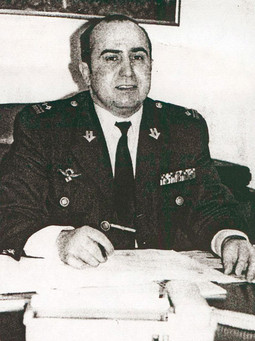 BRIGADIER Mirko Ljevar was the project leader in equipping and acquiring Mi-171S helicopters
BRIGADIER Mirko Ljevar was the project leader in equipping and acquiring Mi-171S helicopters Competitors fighting for contracts could not have delivered information to journalists, because all published documents on the criminal acquisition system have reached the media from the Defence Ministry and Armed Forces, not from the offices of the competitors. The mediators, provision hunters, and aforementioned competitors, not the direct suppliers from Russia, have selected people who today hold leading positions in the Defence Ministry and Armed Forces, all with long dossiers at the Military Intelligence Agency and relations with the suppliers and mediators. Previously, as is the case today, the government has had a state agency and direct suppliers, but it did not work in that sense due to the basic motive – as many people in the system as possible should get money from the deal.
Plan: earnings on modernization
After they heard of the problems with the new Mi-171S helicopters, especially for the malfunctioning of the main and secondary radio transmitters on the first two helicopters and the poor integration of the western system and the Russian radio transmitters, as well as numerous other defects, individuals within the Defence Ministry are asking whether someone ordered this level of equipment on purpose so that the helicopters would have to be modernized quickly, whereby the same individuals who provided the Military Aeronautics with low quality parts without a clear origin ten years ago would once again profit, with assistance from officers from the Croatian Army.
Brigadier in the arms trade
Following a recommendation made by Imra Agotic back in 1993, arms trader Ivan Hudoletnjak got in touch with Mirko Ljevar, then an employee of the Technical Department for Aircrafts. Ljevar became Hudoletnjak’s right hand man, thanks to his knowledge of Russian technology and the language. SIS agents record that Ljevar worked more as an informal employee in Hudoletnjak’s company Hemerson, and less and less as an employee of the Defence Ministry. Most documentation gathered by the agents is related to fraud carried out during overhaul and servicing of aircrafts. Most profits were made in acquiring spare parts. That is how it was established that Hudoletnjak charged the Defence Ministry HRK 1,450,000 more than what would have been charged if purchased from ACM.
Related articles
Fatal modifications ordered by Zagorec
The results of the investigation of the commission that investigated the fall of a Mi-8 VIP helicopter in Vukovar last year have shown without a… Više
Latest news
-
28.10.2010. / 14:15
'A profitable INA is in everyone's interest'
-
28.10.2010. / 09:38
Sanader’s eight fear SDP — Won’t bring down Government
-
21.10.2010. / 15:02
Interior Ministry turned a blind eye on Pukanic assassination
-
20.10.2010. / 09:34
Barisic could bankrupt HDZ




